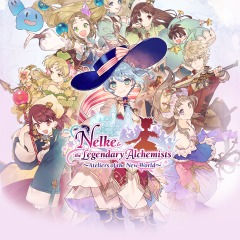Over capacity.
To celebrate the 20th anniversary of the Atelier series, Koei Tecmo and Gust prepared an event and announced “Nelke & the Legendary Alchemists” which would feature all the past main characters from its series history.
As someone who has been following this long running franchise since the PS2 generation, I was excited to see some old, familiar faces again.

She said, ten minutes before recruiting an army of alchemists.
MSRP: $59.99
Platforms: PS4, PC. Switch
Played on: PS4 Pro
Played: 20~ hours
As the newly appointed mayor of Westbald, Nelke vows to develop the fledgling town into a flourishing hub of trade and innovation. In order to accomplish her goals, she will need assistance from alchemists and lucky for her, Westbald is home to an ancient mystery which has a way of drawing in alchemists from all over the world.
The very first thing to note is that Nelke & the Legendary Alchemists does not follow the typical Atelier formula and plays more like a town building simulator. Not to say that this is some kind of a SimCity clone, but the complexity of mechanics in previous titles like crafting, combat and time management have been toned down significantly.
After a workshop is created and placed on the map, an alchemist can be put to work crafting items as long as there are crafting materials. Each craftable item is designated a numeric score to indicate the difficulty in crafting, and the more skilled the alchemist, the more things they can make in one turn.
Instead of micromanaging each ingredient to get the best results or inherit some special ability, the items are simply produced without much fanfare. Given there are well over a dozen different alchemists productions to juggle at once, it makes sense to keep synthesis simple and to the point, but as one of my favorite things to do in an atelier game is to min/max ingredients to make ultimate items and equipment, I couldn’t help but feel a bit disappointed by the lack of depth in the alchemy system.
Exploring maps, gathering ingredients and even the combat itself has been simplified as well, as there aren’t any open maps to explore. Instead, when an area is selected, the characters I’ve chosen are shown walking the road as they stop from time to time to pick up items or engage in combat encounters automatically.
Battles play out quickly, with a division of front line fighters and backline alchemists, but the turn-based combat engine felt barebones without many options and I found myself using auto-mode to get things moving quickly. Strengthening my party members outside of simply leveling them up was tied to the quantity of particular items I created, which made for a tedious affair of farming the same ingredients and mass producing items.

The combat is dull, plain and simple.
During free time, I had a set amount of action points which I could spend conversing with other characters or go around exploring new areas, but it felt very limiting as even picking up quests expanded these points. Normally, I am a fan of having meaningful choices where doing one thing often means you can’t do another, but as I wanted to interact with the all-star lineup of characters, not being able to do so without sacrificing progress in the game felt like an odd choice.
When all the systems are fully introduced, a turn is usually spent building new facilities and assigning personnel to their respective quarters. Then, I would designate jobs like harvesting, synthesizing, selling and more to each character trying to fulfill a variety of different conditions that would ultimately expand the town and increase the things I can craft/sell.
This flow can get quite addictive, but as my town grew to a population of over ten thousand and I had more alchemists on my payroll than I knew existed, things quickly got way too hectic.
It’s a classic case of “too many cooks” or rather, “too many alchemists” in this instance, and trying to keep a stock of what ingredients I needed, what I wanted to craft, sell and research became more and more overbearing, so much to the point that I contemplated starting an excel sheet so I could keep track of all the things I was trying to accomplish.
Luckily, I stopped myself before doing so as I thought about it that would make it more like work than a game I was playing to enjoy.

As areas become more developed, they grow in size, allowing for even more development.
What I appreciated most as a longtime fan of the series was the attention to detail like all the different alchemist theme songs that would play when I was visiting their atelier. Given it’s been well over a decade since I heard the theme song to Atelier Iris, walking into Klein’s workshop and hearing it again after all this time made me stop in my tracks just to enjoy the song.
It was also nice to see many of the characters realized in 3D for the first time, and even though this isn’t Gust’s best work from a visual standpoint, each character’s individual charm shone through the art style.

Arland crew here to represent!
Instead of a glorious celebration of all things Atelier, Nelke & the Legendary Alchemists comes off more like a misguided attempt at creating a spinoff by toning down all the elements that makes Atelier games enjoyable in the first place.
Fun Tidbit – I could go for a new game in the stylings of Mana Khemia with a stronger emphasis on combat/customization over the alchemy focused recent entries.
Review copy of game provided by publisher.
